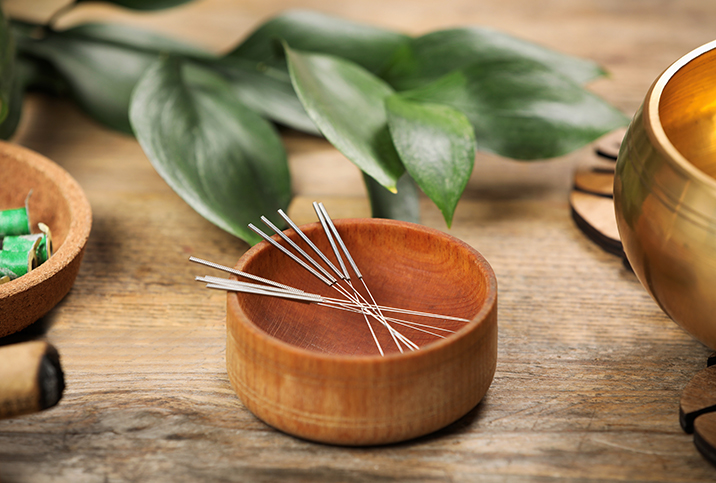What Does Every Man Need to Know About Endometriosis?

If you’re a man, you’re probably wondering if you can have endometriosis. There have been less than 20 documented cases of men having endometriosis so you’re forgiven if this is the first you’re hearing about this condition. However, this is a common health problem for women, affecting an estimated 6.5 million in the United States.
Endometriosis is a condition in which endometrium-like tissue grows outside of the uterus, often in the pelvic wall, intestines, bladder, ovaries, fallopian tubes or rectum. During a typical menstrual cycle, uterine tissue thickens and then sheds—causing a period—but with endometriosis, this growth still thickens but has nowhere to go, causing inflammation and pain.
If your partner is one of the 1 in 10 women who live with endometriosis, it can be difficult to know how best to support them. Unfortunately, the condition is still not fully understood, and even medical professionals often attribute the disorder's pain to other factors (or worse, ignore it altogether as period pain).
One of the best things you can do as a partner is to learn some truths about endometriosis so you can understand a bit more about the frustration, potential fertility challenges and physical pain your partner experiences.
It's not 'just a bad period'
It's a common misconception that all periods are painful, and this belief often leads to endometriosis being dismissed as a normal part of menstruation. One study found the median time from the onset of symptoms to a diagnosis of endometriosis was seven years. Sometimes the condition isn't looked into until a woman experiences unexplained infertility.
Signs of endometriosis may be seen on an ultrasound in some cases, but not always; the only surefire way to diagnose endometriosis is with laparoscopic surgery.
Encourage your partner to speak to their doctor about their symptoms or switch doctors if they're not being heard, or consider advocating on your partner's behalf or accompanying them to appointments.
"Endometriosis symptoms can be debilitating," said Charis Chambers, M.D., an OB-GYN based in Columbus, Georgia, who is known as the Period Doctor on Instagram. "By speaking up, they give themselves the best opportunity for evaluation and therapy that prioritizes their comfort."
The cause of endometriosis isn't fully known
The cause of endometriosis isn't fully understood, which can make diagnosis difficult.
What we do know about endometriosis is that the uterus's endometrium-like cells grow elsewhere. It can also affect the interior structure of the pelvis, including the fallopian tubes and ovaries, said James A. Gohar, M.D., an OB-GYN and the co-founder and CEO of Viva Eve, a women's health practice with locations in New York.
Endometriosis is believed to be caused by retrograde menstruation, a condition in which a woman's menstrual flow, which contains endometrial cells, moves backward into the pelvic cavity instead of out of the body, Gohar said. The displaced endometrial cells then stick to the pelvic walls and surfaces of pelvic organs.
Other possible causes include genetic predisposition, immune system problems, hormones and endometrial tissue being moved during surgery.
It's worse at certain times of the month
Most women with endometriosis experience a flare-up of pain during their period.
"[Endometriosis] worsens with the fluctuation of reproductive hormones like estrogen and progesterone," Chambers explained. "When your hormones rise and fall throughout your menstrual cycle, they trigger the shedding of the uterine lining. When your hormones signal for period bleeding to begin, the abnormal cells—wherever they are—start to bleed, too. This causes inflammation, scarring and pain."
Typically, the pain is in the lower abdomen or the pelvis, but it can also be felt in the rectum, tailbone or back.
Endometriosis and potential fertility challenges
Many women with endometriosis get pregnant without intervention—an estimated 70 percent—but endometriosis can make conception more difficult.
"Endometriosis affects fertility primarily by causing inflammation and scarring. Scarring, especially around the ovaries and fallopian tubes, can make it difficult for an egg to make its way into the uterus successfully," Chambers said. "Chronic Inflammation can make the uterus a nonideal place for an embryo to implant. For these reasons, many people with endometriosis may have impaired fertility."
No cure, but symptoms can be managed
There is no known cure for endometriosis and it manifests differently in each person, which can make pain management tricky.
"The good news is that medications, surgery and lifestyle changes can help find relief and manage the pain. Nonsteroidal anti-inflammatory medications such as Advil or Motrin or Midol have been used to relieve the pain," said Jane L. Frederick, M.D., a board-certified reproductive endocrinologist and medical director of HRC Fertility in Newport Beach, California.
Some people may manage pain with CBD, used orally or in a lotion or suppository.
Certain hormone therapies, such as birth control pills, can be prescribed to adjust the hormone levels in the body, which may reduce pain, Frederick added. The goal is to halt the egg-releasing cycle that generates much of the pain and other symptoms linked with endometriosis every month. It's not uncommon for endometriosis to get worse when a patient gets off the pill because the body's menstrual rhythm begins again.
Certain lifestyle adjustments—getting enough sleep, exercising and eating a balanced diet—can also help keep symptoms manageable, though that's not to say other lifestyle choices cause endometriosis.
Surgery is an option
Laparoscopic surgery is an option for certain patients, especially those having difficulty getting pregnant as a result of their endometriosis. With laparoscopic surgery, small incisions are made in the pelvis and the surgery is performed with the help of a tiny camera. Excess tissue is burned or cut away, but the incision is tiny and barely leaves a scar.
"If you are unable to find relief from endometriosis pain, your doctor may recommend surgery to remove excess tissue growth or abnormal scar tissue in your pelvic region," Gohar said. "These surgeries are relatively conservative and often largely painless. Studies have shown that these surgeries greatly increase the chances of pregnancy."
Living with endometriosis can be frustrating and painful, especially since it can take so long to get a diagnosis. Learning truths about endometriosis and what patients experience is one of the best ways you can understand and support your partner.


















